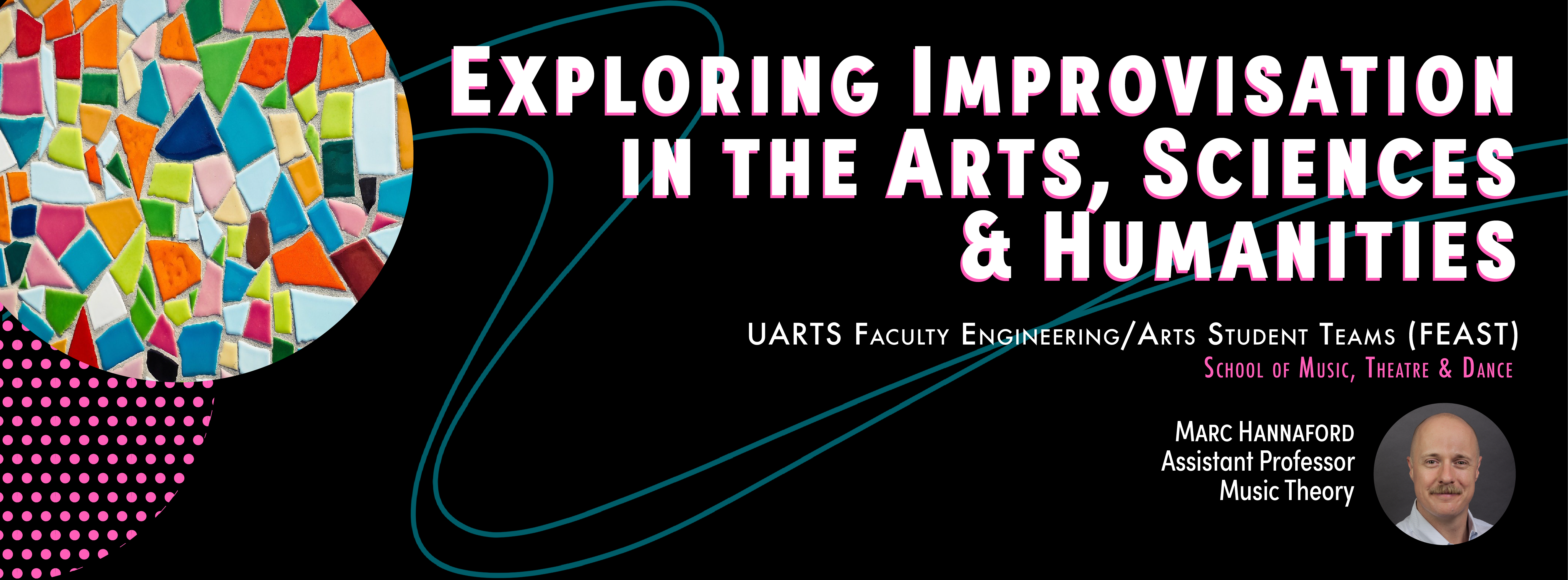
*This project is on hiatus as of Winter 2023.
This team is developing an interactive sound installation that helps users learn the basics of coding. Utilizing research on embodied engagement with sound and critical improvisation studies, this installation will facilitate real-time audio feedback for users’ physical interactions with it. The code that facilitates these interactions will then be displayed, helping users understand the interactive potentials of coding.
No prior knowledge of the field of Critical Improvisation Studies is required to be a member of this group. Applicants to this group should be willing to do multi-disciplinary reading and learn to discuss ideas with people outside of their own field/major. Ideally, this group will have maximal disciplinary diversity: applicants from all fields are strongly encouraged. If you are interested any issues that relate to the ideas in the above paragraphs, then we welcome your insights and energy.
Faculty Project Lead
 Marc Hannaford is a music theorist whose interests lie at the intersection of jazz and improvisation, identity (especially race, gender, and disability), performance, and embodiment. He completed his PhD at Columbia University in 2019 with a dissertation on Muhal Richard Abrams, pianist, composer, and cofounder of the Association for the Advancement for Creative Musicians (AACM). His publications appear in Music Theory Online, Women & Music, and Sound American, and the Society for Music Theory’s Jazz Interest Group awarded him the 2019 Steve Larson Award for his paper, “Affordances and Free Improvisation: An Analytical Framework.” As a committed pedagogue, Marc helps students develop personal engagements with music via the critical exploration of manifold approaches: theoretical, analytical, historical, and creative. He is also an improvising pianist, composer, and electronic musician who has performed and/or recorded with Tim Berne, Ingrid Laubrock, Tom Rainey, Tony Malaby, and William Parker.
Marc Hannaford is a music theorist whose interests lie at the intersection of jazz and improvisation, identity (especially race, gender, and disability), performance, and embodiment. He completed his PhD at Columbia University in 2019 with a dissertation on Muhal Richard Abrams, pianist, composer, and cofounder of the Association for the Advancement for Creative Musicians (AACM). His publications appear in Music Theory Online, Women & Music, and Sound American, and the Society for Music Theory’s Jazz Interest Group awarded him the 2019 Steve Larson Award for his paper, “Affordances and Free Improvisation: An Analytical Framework.” As a committed pedagogue, Marc helps students develop personal engagements with music via the critical exploration of manifold approaches: theoretical, analytical, historical, and creative. He is also an improvising pianist, composer, and electronic musician who has performed and/or recorded with Tim Berne, Ingrid Laubrock, Tom Rainey, Tony Malaby, and William Parker.
Prior to joining the School for Music, Theatre, and Dance, Marc worked as a Lecturer in Music Theory at Columbia University. He taught courses in music theory and analysis, twentieth century music, jazz theory, and black experimental music, among others. The Department of Music and Graduate School for the Arts and Sciences both recognized his teaching and research with the Mason Fellowship in Music and Serwer Fund Award. While at Columbia Marc also cofounded the Comparing Domains of Improvisation Discussion Group, which provides a forum to compare and contrast the concept and practice of improvisation in various creative and quotidian domains, and the Diversity in Music Theory discussion group, which aims to expand and deepen members’ approaches to cultivating diverse and inclusive research, teaching, and service within music theory.
Originally from Australia, Marc discovered academic music theory through performance and his conservatory training as a jazz pianist. In 2010 he completed a research project that adapts composer Elliott Carter’s rhythmic language for improvised contexts. This convergence of contemporary composition, rhythmic complexity, and improvisation led him to the United States and remains a secondary research interest.
Between research, teaching, and performing, Marc enjoys cooking, walking his dog (Reggie), and outdoor activities such as hiking and camping.
